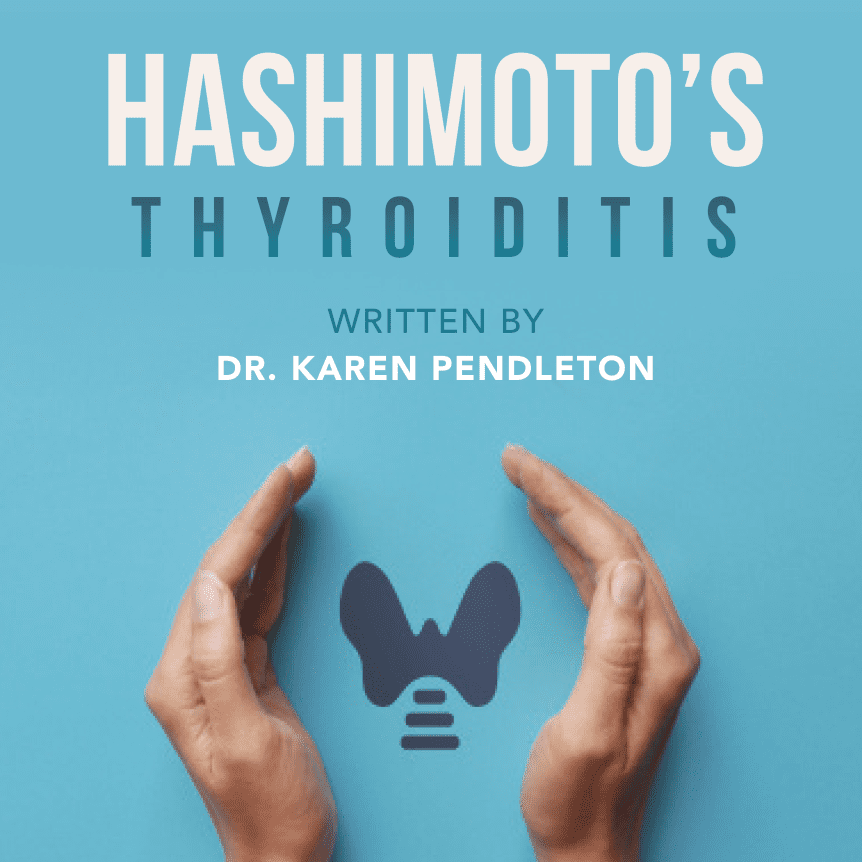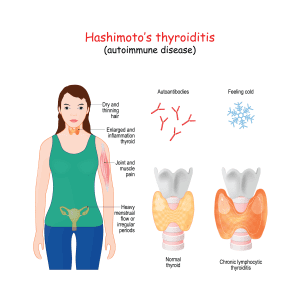In the past couple of weeks, I have encountered several patients…new, existing and referred that I’ve diagnosed with Hashimoto’s thyroiditis. It’s not a rare thyroid disease, yet numerous people are suffering and don’t have to. Are you curious if you or your loved ones are unnecessarily burdened with this somewhat overlooked disease? Come with me and discover more about this thyroid disorder.
This information will transform your health…really your life.
What is it?
Do You Have It?
What To Do About It?
What if brain fog, memory loss, exhaustion, weight gain and pain are due to low thyroid hormone (hypothyroidism)?
In numerus discussions with patients, the conventional medical system has discounted the individuals who have these symptoms. The symptoms are attributed to anxiety, depression, or hypochondria.
What if my symptoms continue even though I am on thyroid medication?
A recent patient on thyroid medication had a normal TSH (thyroid hormone stimulating hormone), indicating the current treatment was in therapeutic range. But the fatigue and memory issues were frustrating. A more detailed thyroid evaluation revealed thyroid antibodies, indicating an autoimmune process. Armed with new information, a different treatment strategy addressing the autoimmune issue was started. The goal is better control over the immune system and thyroid antibodies.
Let’s talk Thyroid Gland
The thyroid is a small gland located in the anterior neck. But it packs a punch in regulating body function. Important thyroid hormones regulate heart rate, blood pressure, breathing, body temperature, metabolism, and menstrual cycle. The thyroid affects every organ in the body.
Hypothyroidism
is a Deficiency in Thyroid Hormone
Symptoms:
Sluggish metabolism
Weight gain
Fatigue
Forgetfulness
Cold intolerance
Weakness
Muscle cramps
Stiffness
Joint pain
Dry skin
Hair loss
Emotional issues
Menstrual irregularities
Infertility
Hyperthyroidism
is Too Much Thyroid Hormone
Symptoms:
Weight loss
Heart palpitations
Anxiety
Fatigue
Irritability
Increased appetite
Heat intolerance
Menstrual disturbances
Hashimoto’s Thyroiditis
A unique form of hypothyroidism is Hashimoto’s thyroiditis, which is an autoimmune issue with a genetic predisposition. Over fourteen million Americans suffer from Hashimoto’s disease.
Symptoms can be a combination of hypothyroidism and hyperthyroidism. Why? At first, the thyroid gland still puts out thyroid hormone. The problem is the body’s immune system sees the thyroid cells as foreign and has developed antibodies to the cells. The cells can be damaged or destroyed. Initially in the attack, the hormone is released into circulation, causing excess hormone levels. Once the hormone is cleared from the body, the person becomes hypothyroid. The damaged gland has difficulty making thyroid hormone.
The challenge for people with Hashimoto’s disease is they experience other inflammatory symptoms.
Irritable bowel syndrome
Acid reflux
Diarrhea
Constipation
Bloating
Rashes
Allergies
Pain
Other issues can also occur:
Intestinal permeability (leaky gut)
Nutrient deficiencies
Anemia
Gum disorders
Food sensitivities
Poor stress tolerance
Hypoglycemia
What is going on?
The body is a complex system. A person with Hashimoto’s disease can have multiple symptoms related to a chronic immune system overload.
Adrenal gland dysfunction
Gut dysbiosis
Impaired digestion
Impaired detoxification
Inflammation
So, what’s the issue?
Hashimoto’s disease is frequently lumped into hypothyroidism as a broad category. Once the diagnosis of hypothyroidism is made, the conventional medical model may not pursue further diagnostic evaluation. The hypothyroidism is treated with hormone replacement. But the underlying immune system issues are ignored.
 Stages of Hashimoto’s Disease
Stages of Hashimoto’s Disease
1. Genetic predisposition; no manifestation of the condition
2. Beginning stages of the autoimmune attack
a. Thyroid antibody tests are positive
b. Other thyroid tests are within normal limits
c. Person may be highly symptomatic
d. People misdiagnosed with anxiety, depression, or labeled as hypochondriacs
3. Early thyroid gland failure
a. Subclinical hypothyroidism
b. TSH (thyroid stimulating hormone) is slightly elevated
c. Conventional approach is wait and see until thyroid gland burns out
4. Thyroid gland failure
a. Thyroid gland cannot make enough hormone
b. Labs show elevated TSH and low T4 (thyroxine) and T3 (triiodothyronine) levels
c. Patient likely to receive prescription for synthetic thyroxine
5. Progression to other autoimmune diseases like lupus, psoriasis, and rheumatoid arthritis
Early diagnosis is important
Reduce damage to thyroid tissue
Identify the triggers leading to thyroid gland destruction
Here are things the conventional medical model ignores about Hashimoto’s disease.
The problem is the immune system
Stress impacts the immune system
Repair the gut to improve the immune system
Gluten is an issue
Environmental toxins have a role
Infections, especially viral, fuel the condition
Hashimoto’s disease can be successfully controlled
Appropriate treatment modalities are the key
Other conditions affected by poorly treated Hashimoto’s disease.
High cholesterol
Fatty liver
High blood pressure
Heart disease
Heart failure
How to determine if Hashimoto’s disease is present?
Appropriate blood work evaluation includes the following test
TSH (Thyroid stimulating hormone)
Free T4 hormone
Free T3 hormone
Thyroid antibody testing
Thyroglobulin antibodies
Thyroid peroxidase antibodies
What can the patient do to reverse the autoimmune symptoms of Hashimoto’s disease?
Patient education
Recover your health
Find a physician who understands the disease and hears you
Take a root cause approach for immune system recovery
Root Cause Approach
An accurate diagnosis
Appropriate medications for your needs
Remove toxins
Heal your liver
Fix your nutrition
Relieve stress on the adrenal glands
Improve your gut health
Enjoy life
What is the next step?
Action Or Inaction? Which will you regret more?
Regret has a profound impact on how we live our lives. It is the difference between living the healthy life we are meant to live or simply getting by. And, by simply getting by, our health could get worse.
There are two types of regret. The regret of action is doing something we wish we hadn’t done. The regret of inaction is doing something we wish we had done. Really, it is the fear of change.
Acting on your health changes your life. If you have Hashimoto’s disease, what steps are you willing to take to improve your health?
Step 1. Learn more about Hashimoto’s disease
Step 2. If you have uncontrolled Hashimoto’s disease, take some initial steps to begin the healing process. Eliminate sugar, dairy, soy, gluten, coffee, and alcohol.
Step 3. Seek help from a healthcare provider who listens to you and understands the root causes of illnesses like Hashimoto’s disease.
If I can be of any further service either in Shreveport (pairO’docs Bio-Rejuvenis) or the Greater New Orleans Area (Bopp Optimal Health), please reach out to me by completing the Healthspan Quiz at www.drkarenpendleton.com
DISCLAIMER:
All of the information found in this article is based on the opinion of the author Karen M. Pendleton, M.D. The information is meant to motivate readers to make their own health decisions after consulting with their own health care providers. All readers should consult a doctor before making a health change, especially those that are related to a specific diagnosis or health condition. No information in this article should be relied on in determining a diet, making a medical diagnosis or determining a treatment for a medical condition. The information in this article is not intended to replace a relationship with a qualified healthcare practitioner and is not intended as medical advice. No information in this article should be used to diagnose, treat, prevent or cure any disease or condition.


 Stages of Hashimoto’s Disease
Stages of Hashimoto’s Disease